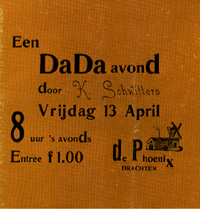
 Dada is a life style, not art
Dada is a life style, not art
 Dada is a life style, not art
Dada is a life style, not art
 The dada campaign in the Netherlands was a success. Lots of people reacted to the invitations and posters. In the breaks the artists sold their magazines Mécano and Merz and their manifestoes like 'Wat is dada?'.
The dada campaign in the Netherlands was a success. Lots of people reacted to the invitations and posters. In the breaks the artists sold their magazines Mécano and Merz and their manifestoes like 'Wat is dada?'.
But why do I spend so much attention to those dada soirees in the Netherlands? Dada is an art movement, you might say. Dada has brought us some very important artists, like Marcel Duchamp, Georg Grosz, Max Ernst, Hans Arp, Francis Picabia, Kurt Schwitters.
To clarify this line of argument I have to return in history to the times of the Renaissance. It was the period in which artists for the first time in history became aware of the talents they possessed. Before artists were mere craftsman, men who worked with their hands. Normally people would look down on them.
With artists like Michelangelo and Leonardo da Vinci this changed. Art became a purpose in itself and the artist became a genius for the public. In the eighteenth century this notion of the genial artist was at its top. In the period dada emerged, between, 1913 and 1924, the artist was still someone the public look up to, a special person with a almost non-human talent.
The crowd in Zaal Rosehaghe did not look at the dadaists that way.
![]() Zaal Rosehaghe
Zaal Rosehaghe
![]() Dada soirée
Dada soirée
![]() Dada Holland
Dada Holland
![]() Life = art
Life = art
![]() Dada stands for diversity
Dada stands for diversity
![]() History of dada
History of dada
![]() Dada Zurich
Dada Zurich
![]() Dada Berlin and Paris
Dada Berlin and Paris
![]() The end of dada
The end of dada
![]() Heritage of dada
Heritage of dada
![]() The dadaist
The dadaist
Updated 3 april 2001; Comments to Martin Woestenburg.
|
Quick Navigation Select the file and GO |

|
Or just go back |